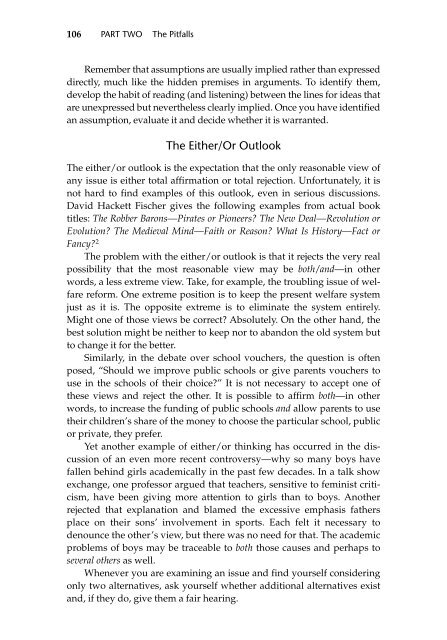Beyond Feelings
Beyond Feelings
Beyond Feelings
You also want an ePaper? Increase the reach of your titles
YUMPU automatically turns print PDFs into web optimized ePapers that Google loves.
106 PART TWO The Pitfalls<br />
Remember that assumptions are usually implied rather than expressed<br />
directly, much like the hidden premises in arguments. To identify them,<br />
develop the habit of reading (and listening) between the lines for ideas that<br />
are unexpressed but nevertheless clearly implied. Once you have identified<br />
an assumption, evaluate it and decide whether it is warranted.<br />
The Either/Or Outlook<br />
The either/or outlook is the expectation that the only reasonable view of<br />
any issue is either total affirmation or total rejection. Unfortunately, it is<br />
not hard to find examples of this outlook, even in serious discussions.<br />
David Hackett Fischer gives the following examples from actual book<br />
titles: The Robber Barons—Pirates or Pioneers? The New Deal—Revolution or<br />
Evolution? The Medieval Mind—Faith or Reason? What Is History—Fact or<br />
Fancy? 2<br />
The problem with the either/or outlook is that it rejects the very real<br />
possibility that the most reasonable view may be both/and—in other<br />
words, a less extreme view. Take, for example, the troubling issue of welfare<br />
reform. One extreme position is to keep the present welfare system<br />
just as it is. The opposite extreme is to eliminate the system entirely.<br />
Might one of those views be correct? Absolutely. On the other hand, the<br />
best solution might be neither to keep nor to abandon the old system but<br />
to change it for the better.<br />
Similarly, in the debate over school vouchers, the question is often<br />
posed, “Should we improve public schools or give parents vouchers to<br />
use in the schools of their choice?” It is not necessary to accept one of<br />
these views and reject the other. It is possible to affirm both—in other<br />
words, to increase the funding of public schools and allow parents to use<br />
their children’s share of the money to choose the particular school, public<br />
or private, they prefer.<br />
Yet another example of either/or thinking has occurred in the discussion<br />
of an even more recent controversy—why so many boys have<br />
fallen behind girls academically in the past few decades. In a talk show<br />
exchange, one professor argued that teachers, sensitive to feminist criticism,<br />
have been giving more attention to girls than to boys. Another<br />
rejected that explanation and blamed the excessive emphasis fathers<br />
place on their sons’ involvement in sports. Each felt it necessary to<br />
denounce the other’s view, but there was no need for that. The academic<br />
problems of boys may be traceable to both those causes and perhaps to<br />
several others as well.<br />
Whenever you are examining an issue and find yourself considering<br />
only two alternatives, ask yourself whether additional alternatives exist<br />
and, if they do, give them a fair hearing.


